Last updated on September 27th, 2024 at 03:33 pm
I talk with and listen to what marketing leaders have been saying this year. Some wished they had invested more in one particular channel because of its long-term growth potential.
We’re growing or we were growing but SEO has not been a channel we’ve really pursued.
Our business has a good reputation but we struggle to maintain a powerful online presence and lose out to smaller brands.
Quick test: Is SEO an underutilized growth channel for your business? True/False
- Most of our organic search traffic is people searching our brand name
- The average position rank of our important keywords is just off the first page of Google
- Our competitors rank well for keywords we should rank for
- We don’t know the value of a prospect for our business
- We pay less than $1000/month for SEO
- A lot of content we publish does not engage our ideal prospect
- No one on our marketing team is dedicated to SEO
Most of our organic search traffic is people searching our brand name
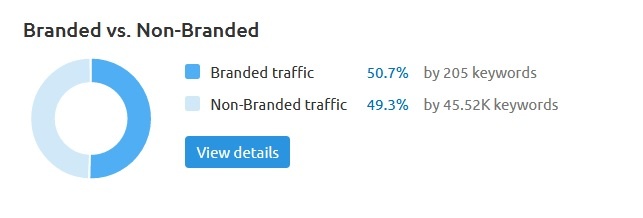
Brand name awareness in search is when people search for your business and find it! It’s one of the signs that your business is mature.
But, if most of the organic traffic you receive from Google, and other search engines, is from your brand name, it’s very likely that SEO is an underutilized growth channel for you.
When a site does rank #1 for its brand name and receives most of its organic search traffic for the brand, it usually means that the business has a customer base.
And that implies that the business clearly understands the ideal prospect (a great prerequisite for SEO).
Knowing your ideal prospect means your business is primed for SEO success.
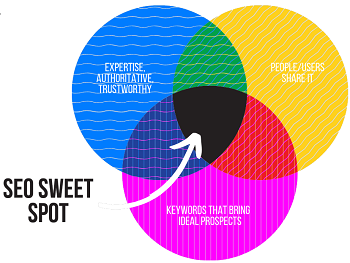
The average rank position of our important keywords is just off the first page of Google
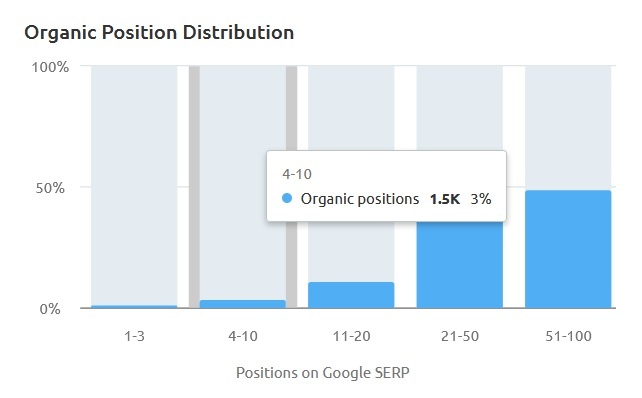
Have you looked at your Google Search Console account lately?
Tons of useful keyword info is there, including all that brand name traffic you are receiving.
Next time you’re logged in, look for the keywords that your site is ranking for that are just out of view of your prospects. (Positions 11-20 are on the second page of Google for most browsers.)
If your landing page were ranked on the first page of Google instead of the second page for those keywords, would that be valuable to your business?
If so, it’s very likely that SEO is an underutilized growth channel for your biz.
Here’s one way I use Google Search Console for SEO:
Our competitors rank well for keywords we should rank for
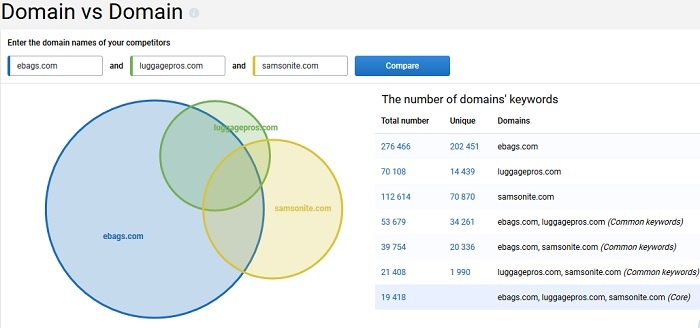
Have you done a competitor keyword gaps analysis for your business lately?
Keyword gap analysis identifies keywords that competitors rank well for which your business does not.
Many competitor analysis tools can provide this: Semrush, Serpstat, Ahrefs, SpyFu, similarweb.
The overlap area highlights the keywords the competitors have in common.
Tracking competitor positions for your important keywords helps you understand your share of voice compared to your competitors and how likely a prospect will find your business.
If you’ve not seen a keyword gap analysis in a while, it’s likely that SEO is an underutilized growth channel for your biz.
Ready to go a little deeper?
We don’t know the value of a prospect for our business
What if you knew every time you spent $1000 to attract prospects, you made enough sales to be profitable?
When you know what a prospect is worth to your business and what it costs to attract her (including cost of goods sold), then you have an idea about how much to spend on a given channel.
Value of a customer = (Total Revenue – Cost of Goods Sold) / Total customers
Value of a prospect = (Total Revenue – Cost of Goods Sold) / Total prospects
(These equations are for ecommerce businesses, but they can be modified for lead-gen.)
Look at the value of a prospect each month to see, at a glance, if you are targeting high value prospects.
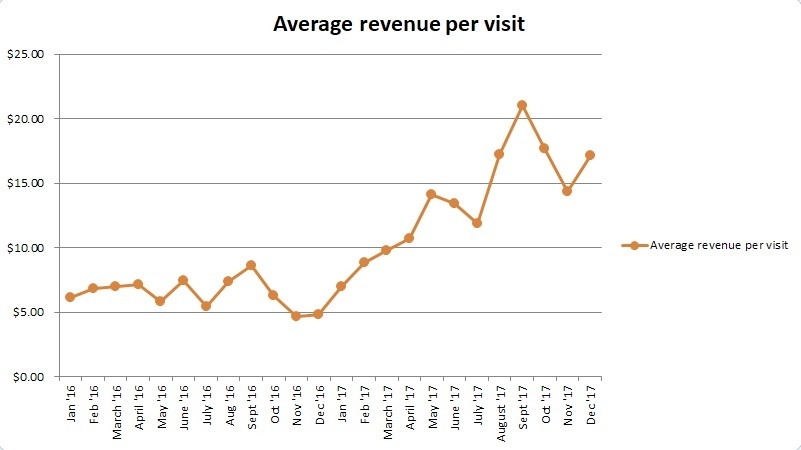
Now dig a bit deeper by looking at the value of a prospect per channel.
For example:
Value of an Amazon Marketplace prospect = (Total Amazon Revenue – Cost of Goods Sold) / Total Amazon prospects
When I do this type of analysis, I’m usually surprised at the traffic channels and keywords that do not bring valuable prospects as well as those that do. Plus, there is unexpected content that brought in revenue.
Tracking % revenue for each channel is a good way to quickly identify traffic quality and revenue trends that are either overvalued or undervalued.

Monitor the value of a prospect periodically, then you can quickly see how any marketing channel is performing.
We pay less than $1000/month for SEO
This issue still contributes to the death rate of startups.
Startups who don’t understand SEO and need help also don’t know how to vet SEO providers. Too often it’s a catch 22 situation.
For those who do survive it’s very unlikely that you’ll be burned again. This is an unfortunate trial by fire and part of the story of many whom I have had the privilege of serving as a SEO provider.
SEO is a long-term strategy that has tremendous upside given time.
For those of you who aren’t sure how to vet SEO providers and end up paying less than $1000/month, I feel for you.
I know it’s tough starting up and you want to maximize return on investment.
Consider this:
- The time value of money. If you invest wisely, you win twice because your investment pays dividends and it puts you in the competitive mix.
- Respect for your business. SEO providers who are curious about your ideal prospect are showing respect for your business and its uniqueness.
- Respect for your time. SEO providers who prioritize their recommendations are showing respect for your time.
- Transparent. SEO providers who track the KPIs that impact your big goal and share those with your team are trying to be transparent with you so anyone can see what and why even if you don’t know a think about SEO.
Can I get an amen?

A lot of content we publish does not engage our ideal prospect
Creating a lot of shallow content so you can rank well for different keywords usually doesn’t work anymore.
The problem: it’s boring or a turn off!
You know, it’s what happens when you speak without listening first: you make the person in front of you wonder if you know much about what s/he is really asking (searching) for.
This doesn’t engage people and search engines will rank it lower so fewer people show their disapproval for unsuitable search results.
Now you are screwed because you spent resources to publish a piece of content that your prospects look at and go “…meh.”
That’s bad no matter how you look at it because your smarter competitor did not waste resources to go after that same prospect.
When you listen first you usually learn what your prospect meant, then you can respond appropriately; make them feel understood before wasting a lot of hot air.
It’s kinda like finding a respectable sales person who asks good questions about your particular situation and then points you to the solution.
Sometimes it might involve creating a researched, in-depth piece of content but not necessarily (search engines like Google really don’t care about length of content).
It’s about providing something that satisfies time after time. Your prospect thinks, “Ok, they know what they’re talking about.” And it’s presented in an attractive, easy to consume way.
Figure out the most relevant keyword phrase for the landing page and speak to that one person.
Now you may be wondering, “I have hundreds of landing pages, where do I start?”
That’s a good question and it is the right way to think about SEO.
Prioritization of time and resources is how you win the “unwinnable” game of SEO.
People who run online businesses think in terms of buying keywords (both SEO and PPC). Your goal shouldn’t be to buy keywords, your goal should be to buy customers.
I created Revenue-based SEO Secrets to help ecommerce businesses prioritize SEO tasks that bring in revenue.
No one on our marketing team is dedicated to SEO
For many businesses all of the above-mentioned issues are resolved if someone on the team is dedicated to SEO, like an employee, or outsourced to a pro, or both.
Here’s why (from other marketing professionals):
As an SEO, a part of your role is to take all of the possible optimizations and figure out which ones are worth spending time on. Any SEO tool will spit out 10s or 100s of ‘recommendations’, most of those are going to be irrelevant to your site’s visibility in search. Finding the items that make sense to work on takes experience.
John Mueller, Google, on this SEO subreddit
For the most part, we would rather make incremental 1% improvements across thousands of pages than optimize a handful of landing pages to 100%.
Oliver Sissons, SEO Manager at Reboot Online – Oliver’s LinkedIn
When you do SEO for long enough you start to see patterns within websites. It’s these patterns that compound in the mind of the serious SEO specialist. And it’s these patterns that allow a great SEO to look at a site and be able to work out what to do to grow the organic traffic.
Andrew Holland, Founder Zoogly Media
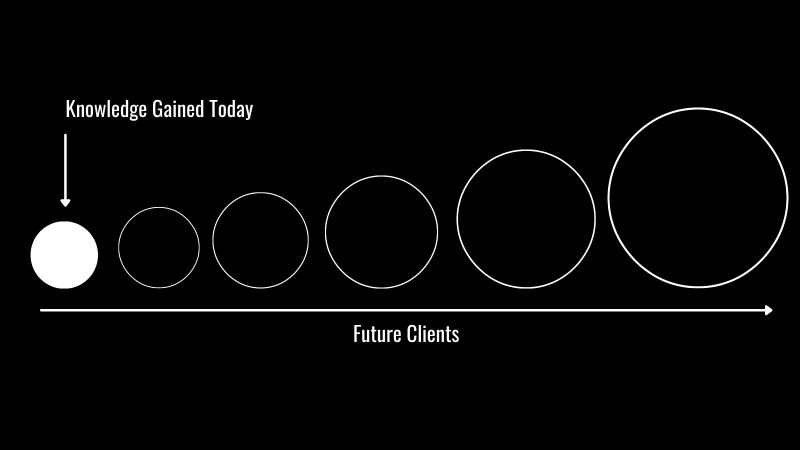
If you are a marketing leader, the question is who.
Who is going to evaluate things and make recommendations that will achieve the goal?
Does someone understand the ideal prospect, their motivation to buy and how they go about making a buy decision?
Who are the writers qualified to fill the gaps in the buyer’s journey?
Can someone tap industry influencers to distribute content and ensure quality links to your site are growing?
When you have an experienced SEO person dedicated to your business, they will have input on these who questions and know how to prioritize time and money on the specific items that will achieve the goal as quickly and realistically as possible.
Now, may I ask you, is SEO an underutilized growth channel for your business?